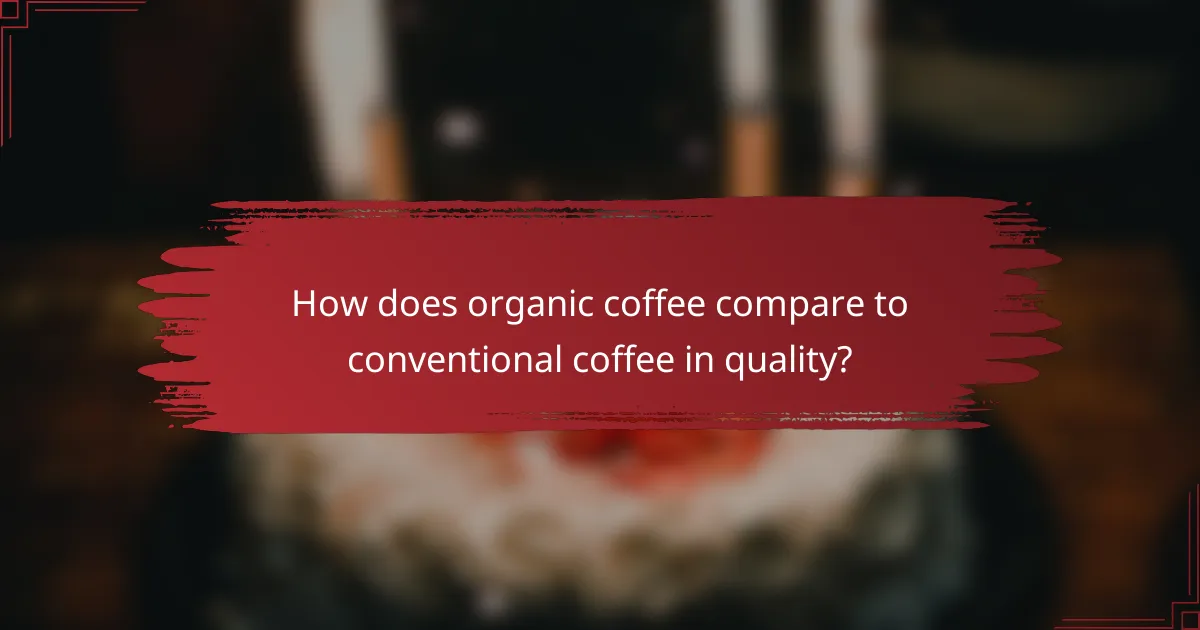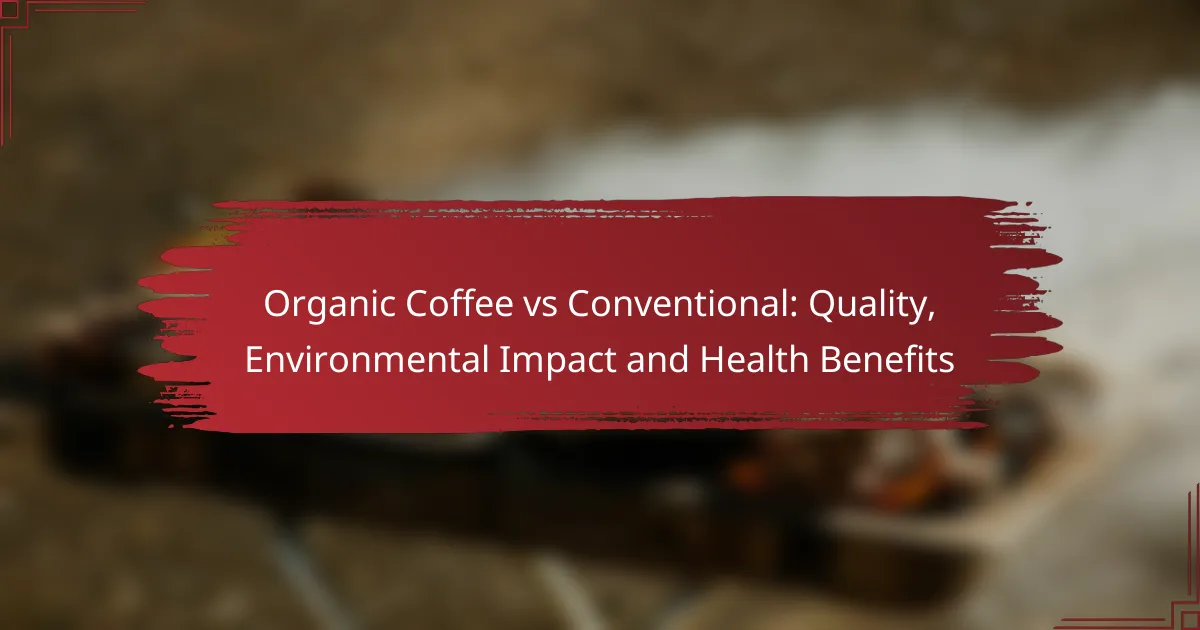Organic coffee stands out for its superior quality, attributed to cultivation practices that eschew synthetic pesticides and fertilizers, enhancing both flavor and bean integrity. Additionally, its environmental impact is more favorable, promoting biodiversity and soil health while minimizing pollution. Health-wise, organic coffee is often richer in nutrients and antioxidants, providing a cleaner alternative that reduces exposure to harmful chemicals.

How does organic coffee compare to conventional coffee in quality?
Organic coffee generally offers superior quality compared to conventional coffee, primarily due to its cultivation practices. Organic farming avoids synthetic pesticides and fertilizers, which can enhance the flavor and overall integrity of the beans.
Flavor profile differences
The flavor profile of organic coffee often exhibits a more complex and nuanced taste compared to conventional coffee. This complexity arises from the diverse growing conditions and the absence of chemical treatments, allowing the natural flavors of the beans to shine through.
Many coffee enthusiasts report that organic varieties tend to have brighter acidity and richer flavors, which can be attributed to the healthier soil and biodiversity in organic farms. In contrast, conventional coffee may have a more uniform taste due to industrial farming methods.
Aroma and freshness
Organic coffee typically boasts a more vibrant aroma, which is a key indicator of freshness and quality. The lack of chemical residues allows the natural oils and compounds in the beans to remain intact, contributing to a more appealing scent.
Freshness is crucial in coffee, and organic beans are often sourced from smaller farms that prioritize quality over quantity. As a result, consumers may find that organic coffee retains its aromatic qualities longer than conventional options.
Brewing methods
When brewing organic coffee, methods such as pour-over or French press can enhance its flavor and aroma, allowing the unique characteristics of the beans to emerge. These methods promote better extraction and can highlight the coffee’s natural sweetness and acidity.
While conventional coffee can also be brewed using these methods, the differences in quality may not be as pronounced. It’s advisable to experiment with various brewing techniques to find the best match for the specific organic coffee being used, ensuring the best possible flavor experience.

What is the environmental impact of organic coffee?
The environmental impact of organic coffee is generally more positive compared to conventional coffee. Organic farming practices promote biodiversity, enhance soil health, and reduce pollution from synthetic chemicals.
Soil health benefits
Organic coffee farming enhances soil health by using natural fertilizers and compost, which improve soil structure and fertility. This approach encourages the presence of beneficial microorganisms and earthworms, leading to a more resilient ecosystem.
In contrast, conventional coffee farming often relies on chemical fertilizers that can degrade soil quality over time. Organic methods can increase soil organic matter by significant percentages, contributing to long-term agricultural sustainability.
Water usage and conservation
Organic coffee cultivation typically uses less water than conventional methods due to improved soil health and moisture retention. Techniques such as mulching and cover cropping help maintain soil moisture, reducing the need for irrigation.
In regions where water scarcity is a concern, organic practices can be particularly beneficial. Farmers can save tens of thousands of liters of water annually by adopting these sustainable methods.
Pesticide and herbicide reduction
Organic coffee production minimizes the use of synthetic pesticides and herbicides, relying instead on natural alternatives. This reduction helps protect local ecosystems and reduces chemical runoff into water sources.
By adhering to organic standards, farmers can significantly decrease the chemical load in their environment, which is crucial for maintaining biodiversity and protecting pollinators. This shift not only benefits the immediate area but also supports global environmental health.

What are the health benefits of organic coffee?
Organic coffee offers several health benefits, primarily due to its cultivation methods that avoid synthetic pesticides and fertilizers. This results in a beverage that may be richer in nutrients and antioxidants while reducing exposure to harmful chemicals.
Antioxidant levels
Organic coffee is often higher in antioxidants compared to conventional varieties. Antioxidants help combat oxidative stress in the body, potentially reducing the risk of chronic diseases. The exact levels can vary, but studies suggest that organic coffee may contain significantly more polyphenols, which are beneficial compounds linked to improved health.
Reduced chemical exposure
Choosing organic coffee minimizes exposure to harmful chemicals commonly used in conventional farming. These chemicals can remain in the beans and may pose health risks over time. By opting for organic, consumers can avoid residues from pesticides and fertilizers, contributing to overall well-being.
Potential health risks
While organic coffee is generally considered healthier, it is not without risks. Some individuals may experience sensitivity to caffeine, leading to issues like anxiety or insomnia. Additionally, organic coffee can still contain mycotoxins, which are naturally occurring toxins produced by mold, so sourcing from reputable brands is crucial.

How to choose between organic and conventional coffee?
Choosing between organic and conventional coffee involves considering factors like quality, environmental impact, and health benefits. Organic coffee is grown without synthetic pesticides and fertilizers, while conventional coffee may use these chemicals, affecting both the coffee’s flavor and the environment.
Price comparison
Organic coffee typically costs more than conventional coffee due to higher production standards and certification processes. Prices can vary widely, with organic options often ranging from 10% to 50% higher than their conventional counterparts. When budgeting, consider how much you value the potential benefits of organic coffee.
For example, a bag of organic coffee might cost between $10 to $20, while conventional coffee could range from $7 to $15. Assess your budget and preferences to determine if the price difference aligns with your values.
Brand reputation
Brand reputation plays a significant role in choosing between organic and conventional coffee. Many consumers prefer brands that prioritize sustainability and ethical sourcing, often associated with organic coffee. Researching brands can help you identify those that align with your values.
Look for reviews and certifications that indicate a commitment to quality and environmental responsibility. Brands with a strong reputation for organic practices may also offer transparency about their sourcing and production methods.
Certification and labeling
Certification and labeling are crucial for distinguishing organic coffee from conventional options. Organic coffee should have a USDA Organic label or equivalent certification, ensuring it meets specific agricultural standards. Familiarize yourself with these labels to make informed choices.
In addition to organic certification, look for other labels like Fair Trade or Rainforest Alliance, which indicate ethical practices. These certifications can provide additional assurance about the coffee’s quality and the environmental impact of its production.

What are the best organic coffee brands available?
Some of the top organic coffee brands include Stumptown Coffee Roasters, Death Wish Coffee, and Peet’s Coffee. These brands are known for their commitment to quality, sustainability, and unique flavor profiles.
Stumptown Coffee Roasters
Stumptown Coffee Roasters is renowned for its high-quality organic coffee sourced from sustainable farms. They emphasize direct trade, ensuring that farmers receive fair compensation while maintaining high standards for quality.
Their blends often feature tasting notes that range from fruity to chocolatey, appealing to a wide variety of palates. Stumptown’s commitment to freshness is evident, as they roast their beans in small batches to preserve flavor.
Death Wish Coffee
Death Wish Coffee claims to be the world’s strongest coffee, and it is certified organic. This brand focuses on high caffeine content while maintaining rich, bold flavors that coffee enthusiasts appreciate.
They source their beans from fair trade farms, ensuring ethical practices. Death Wish Coffee is particularly popular among those looking for an intense coffee experience without compromising on quality.
Peet’s Coffee
Peet’s Coffee offers a selection of organic coffees that are carefully crafted to highlight distinct flavors. They prioritize sustainability and quality, sourcing beans from various regions known for their unique profiles.
With a range of options from light to dark roasts, Peet’s caters to diverse preferences. Their commitment to freshness is reflected in their roasting process, which emphasizes small batches to enhance flavor and aroma.

What trends are shaping the future of organic coffee?
The future of organic coffee is being shaped by increasing consumer demand for sustainability, health consciousness, and ethical sourcing. As more people prioritize environmental impact and quality, the organic coffee market is expected to grow significantly in the coming years.
Consumer Preferences
Consumers are increasingly favoring organic coffee due to its perceived health benefits and superior taste. Many buyers are willing to pay a premium for products that are certified organic, as they associate these with higher quality and better environmental practices.
Shifts in consumer preferences are also influenced by transparency in sourcing. Brands that provide clear information about their supply chains and farming practices often gain a competitive edge.
Sustainability Practices
Sustainability is a key trend driving the organic coffee industry. Farmers are adopting practices such as shade-grown coffee cultivation, which helps preserve biodiversity and reduce soil erosion. These methods not only benefit the environment but also enhance the flavor profile of the coffee.
Moreover, many organic coffee producers are implementing water conservation techniques and reducing their carbon footprints, appealing to eco-conscious consumers. Certifications like USDA Organic and Fair Trade further validate these efforts.
Technological Innovations
Technological advancements are playing a significant role in the organic coffee sector. Innovations in farming techniques, such as precision agriculture, allow farmers to optimize yields while minimizing environmental impact. This includes using data analytics to monitor soil health and crop performance.
Additionally, advancements in processing methods are improving the quality and consistency of organic coffee. Techniques like controlled fermentation and improved drying processes help maintain the unique flavors that consumers seek.
Market Growth and Challenges
The organic coffee market is projected to grow as more consumers become aware of its benefits. However, challenges such as fluctuating prices and climate change can impact supply and quality. Farmers may face difficulties in maintaining organic certification due to pests and diseases, which can lead to increased costs.
To navigate these challenges, producers are encouraged to diversify their crops and invest in resilient farming practices. Collaboration with cooperatives can also provide support and resources to help small-scale farmers thrive in the organic market.



